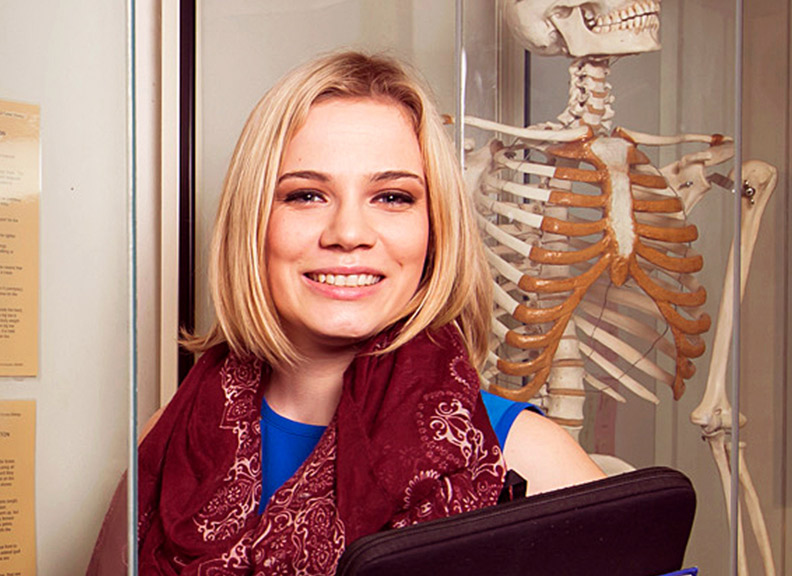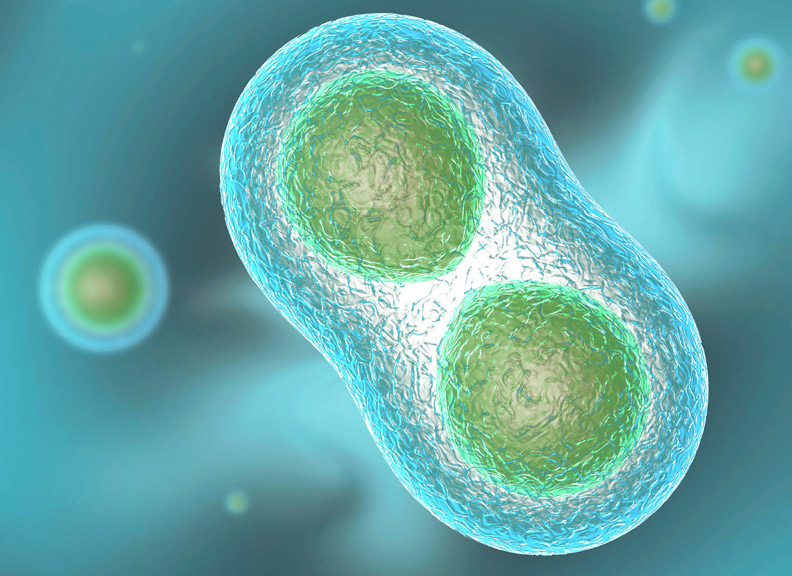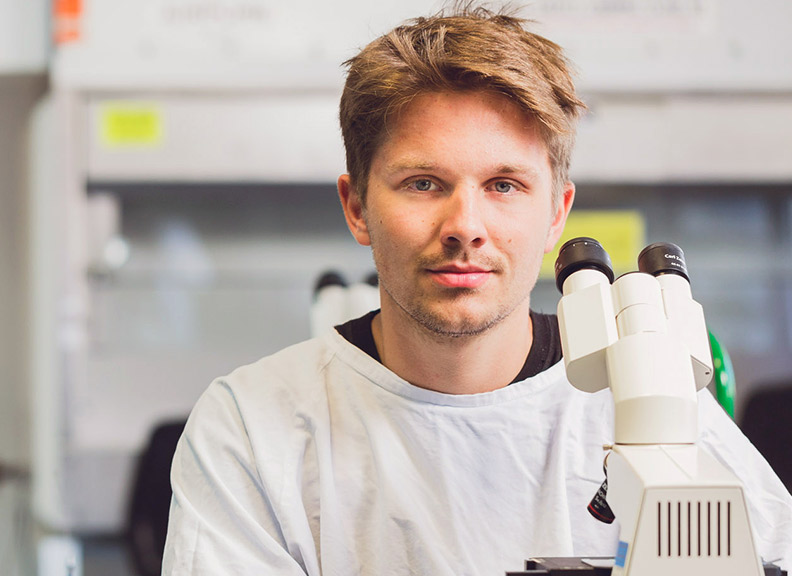Undergraduate
Genetics
Contact us
Address
Student Central
The University of Western Australia (M355), 35 Stirling Highway, Perth, Western Australia 6009
Telephone
131 UWA (131 892)
International
(+61 8) 6488 1000
Hours
Frequently asked questions
Events you may be interested in
Show more eventsCareers and further study
This course opens up a world of future study pathways and career opportunities.
Career Pathways
Studying Genetics at UWA will open doors to a range of possible career opportunities. Genetics graduates may get jobs in biotechnology, drug development and food production. Molecular geneticists may find jobs in genomics laboratories in public and private research institutes, hospitals, and in broader public health, as well as in agriculture and breeding. Population geneticists are needed in healthcare, wildlife conservation and ecological management, using large amounts of genomics data. Outside the laboratory, jobs include patent law and policy-making. Geneticists take on sales and marketing roles in the medical, research and pharmaceutical industries. With their specialist knowledge in inheritance and genomics, geneticists can also become valued science journalists and science communicators or science educators. A UWA Genetics major is a starting point for more specialised industry-specific courses such as bioinformatics, applied quantitative genetics, statistical genetics or genetic counselling. Many genetics graduates do a higher degree by research such as a Master or PhD, so that they can reach more senior positions in research and development in academia and/ or industry.
To prepare you for these diverse career pathways, UWA’s unique degree structure provides you with a wide range of specialisation options. For example, it is possible to combine your major in Genetics with a second major in Chemistry, Biochemistry and Molecular Biology, Microbiology and Immunology, Pharmacology, Agricultural Sciences, Botany, Anatomy and Human Biology, Zoology, or do a extended major in Molecular Life Sciences. You can use your personal interests as a basis for your choice of subjects to study, and ultimately, to direct your career. A tailor-made UWA major in Genetics will empower you to become the next leader in future-proof fields, such as biotechnology, synthetic biology, biomedicine or science communication.
Some international, Australian and WA-based companies and institutions include:
• Pharmaceutical/ medical device companies (e.g. CareDx, CSL, Pfizer, Abbvie, GlaxoSmithKline)
• Agricultural breeding companies (e.g. Australian Grain Technologies, Intergrain)
• Biotechnology companies (e.g. Ozgene, PYC Therapeutics, Dimerix, Novozyme, IDT Australia, Life Cykel, Qiagen, Roche)
• Molecular diagnostics laboratories (e.g. Pathwest, Safe Work Laboratories, Precision Oncology, Mater Pathology)
• Research Centres (e.g. Commonwealth Scientific and Industrial Research Organisation (CSIRO), Centre for Invasive Species Solutions, Telethon Kids Institute, Ingham Institute, Garvan Institute for Medical Research)
• Provisioners of scientific instrumentation (e.g. Thermo Fisher Scientific, Westlab, LabGear Australia)
• Genetic counselling services (Government/State, e.g. WA Health)
• Government agencies (Primary Industries and Regional Development)
• World Health Organisation
• Top ranked universities around the world
With a UWA Bachelor of Science degree in Genetics you will be prepared to help these companies and institutions in solving humanity’s greatest challenges:
• Fighting infectious diseases, such as COVID-19 and drug-resistant bacteria
• Developing treatments for heritable diseases and cancer
• Extending and improving quality of life
• Providing food and water for the world’s ever-growing population
• Understanding and adapting to climate change
• Producing sustainable, bio-based materials
• Preserving our planet’s amazing biodiversity
Further Study
Fees and scholarships
Domestic Student Fees
For Commonwealth-supported places, student contribution amounts are charged by unit, based on area of study. For a fee estimate, go to the Fee Calculator and select “I want to price my units”. Fees are subject to annual indexation. Refer to the Handbook to identify the units required. More information on how fees are calculated.
Scholarships
Scholarships are available to students from a diverse range of backgrounds, including academic achievement, financial need, educational disadvantage, leadership and community service, artistic or sporting achievements, and being from a rural or remote area.
Cost of living
International Student Fees
Onshore international students are charged an annual course fee, charged per credit point at a rate dependent on the course in which the student is enrolled. Annual course fees are calculated based on an annual study load. Check the handbook to confirm the annual study load for your course.
Find out more about international student tuition fees and visit the fee calculator for the relevant course fees.
Fees are subject to annual indexation.
Scholarships
Scholarships are available to students from a diverse range of backgrounds, including academic achievement, financial need, educational disadvantage, leadership and community service, artistic or sporting achievements, and being from a rural or remote area.
Cost of living
Admission requirements
The University of Western Australia welcomes applications from international and domestic school-leavers. If you’re interested in studying one of these majors, find out the admission details below.
Admission requirements
English competency
English is the language of instruction and assessment at UWA and you will need to meet the English language requirements of the University to be eligible for a place.
Minimum overall IELTS score of 6.5, with no band less than 6.0.
Chemistry / biology requirement
Applicants are recommended to have completed Chemistry ATAR and Biology ATAR / Human Biology ATAR.
International students commencing in semester 2 must have completed Biology ATAR and Chemistry ATAR or equivalent to be admitted.
How to apply
Apply through TISC
- Log in to the TISC website
If you’re a Year 12 student studying a WACE course at a WA high school or a pathway program, you are already automatically registered with TISC. - Select your preferences
You can choose up to six preferences when you apply through TISC. You should list your preferences in order from your most desired course onwards; this way you’ll have plenty of options to get into UWA. - Lodging your application
You’re almost there! After answering a few questions, you’ll need to make a declaration about your application. - Application processing fee
Your TISC application is lodged once you’ve completed the payment. For more information on fees and payments, visit the TISC website.
Course details
About the course
Quick details
- Available
- Perth (Crawley campus)
- Full-time
- Part-time
- On-campus
- Semester 1, Semester 2
- 16-25 hours teaching time, plus your own study time
- Undergraduate
- MJD-GENET
- 3 years (BSc), 4 years (BPhil [Hons])
Course Structure
Our undergraduate degrees offer you a broad range of options allowing you to combine subjects in a way that matches your career goals and personal interests.
Popular combinations
You may also be interested in these courses
Your degree options
This major is offered as a degree-specific, or first, major for these degrees. It is also offered as a second major in our other bachelor's degrees.






 Botany
Botany  Microbiology and Immunology
Microbiology and Immunology  Bachelor of Science
Bachelor of Science
 Bachelor of Philosophy
Bachelor of Philosophy